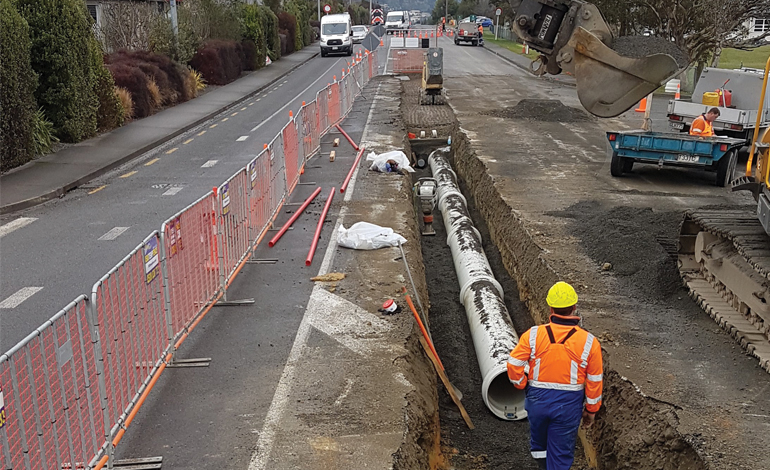In what is a major investment by the Marlborough District Council, the upgrading of the council’s ageing sewer infrastructure is progressing well. Stage one was completed in 2012 and now stages two and three are underway. By RICHARD SILCOCK.

FULTON HOGAN SECURED the Picton wastewater contract for the current two upgrade stages under a tender process that saw three contractors invited to bid.
Bruce Oliver, projects engineer for Marlborough District Council (MDC), says: “At a cost of $19.4 million it is a sizable amount of money for this small town of only 2500 properties, but the old system, which is 85-years-old was failing in parts and was well overdue for replacement.
“During times of extremely high rainfall, some untreated sewage was being discharged into the harbour and this was exacerbated at times during the summer with the influx of visitors.
“With the town an important tourist hub, a mecca for boaties, and it being the inter-island ferry terminus, there is an expectation the town will grow in size over the coming years so it was important to have a more robust system in place able to cope with the increasing demand.”
Physical work on stages two and three began in May this year and will take through until April or May next year to complete, with stage four expected to commence in 2020 as funding becomes available.
The current work involves replacing almost all the old, main-trunk sewer pipeline and some of the lateral lines. The contract also calls for the construction of three new pump stations that will pump the sewage to the treatment plant (STP) on the west side of the town, and the construction of a new bypass treatment facility. Discharge of the treated effluent will be into deep water in a part of the harbour that is well away from the Picton foreshore and marina at Waikawa.
Rowan Gardner, project manager with Fulton Hogan, says there have been no delays or issues so far, albeit there are variable ground conditions ranging from dense clays through to organic soils and rock along the project.
“Our subcontractor Tru-Line Civil is doing most of the trenching work and pipe laying.
“They are excavating to a depth of between 1.5 to 4.8 metres due to the undulating ground and the need to maintain a consistent gradient of the PVC and PE pipes which range from 375mm to 500mm in diameter,” he says.
“In some areas they will utilise trenchless methods to avoid disruption to rail traffic.”

Rowan says this has allowed them to concentrate on the construction of the three pumping stations, the largest of which is at Dublin Street, with the others at Surrey Street and Fisherman’s Reserve. The Dublin Street facility is being built adjacent to the existing pump station.
“So far we’ve driven sheet piles nine-metres deep at Dublin Street using a vibro-hammer in preparation for the inlet and wet-well excavations.
“As the pump stations are all at low points of the topography and will be largely below ground level we can expect groundwater issues so we will be dewatering using pumps and wells to control the water level.
“As there is a proximity to some local streams precautions are being taken to ensure there is minimal discharge of silt into those waterways.”
In addition to the new pump station at Dublin Street, this building will also house the bypass treatment station.
“The bypass plant will comprise a series of mechanical screens and UV treatment to ‘process’ the sewage and will be housed in a concrete building to maintain water tightness and ensure there is no egress or ingress,” says Rowan.
“There is also a bio-filter system to minimise odours housed in a timber outbuilding. This plant will be used to treat any excess sewage that cannot be ‘processed’ at the main STP during times of high throughput.”
The three pump stations will comprise inlet chambers and ‘wet-wells’ excavated to a depth of up to 6.7 metres. Electrically driven ‘flygt’ pumps will be bolted to a concrete slab and will be capable of handling 130 Iitres of sewage per second. There will also be standby diesel generators in the event of power outages.
The upgraded system will operate using gravity and pressure due to the undulating nature of the terrain and the location of the STP which is on a hill above the town.
In addition and as part of the project, a 180mm diameter PE pipeline is to be laid to carry treated effluent from the STP under pressure to some of the public parks around Picton for irrigation purposes.
Disruption to traffic, businesses and households has been minimal with the council running a public information website and communicating with stakeholders that include DOC, road authorities, KiwiRail and affected property owners on a regular basis.
Fulton Hogan is also providing advance notice of the work where it impacts on properties and residents. To minimise traffic disruption, work along Waikawa Road is being programmed to take place during the quieter ‘off-season’ winter period of the year.
“Pavements will be reinstated to an ‘as was’ status as the work progresses as there is an expectation that other utilities may be looking to upgrade in some areas,” says Bruce.
“Once complete, it can be expected that Marlborough Roads will be assessing the status of the roads during their usual maintenance assessments.
“Plans for landscaping the various sites have also been prepared and will include plantings to screen the new pump stations.
“Once complete the capacity to pump and treat sewage will be significantly increased and there is an expectation that the water quality and the marine environment of the harbour will be greatly improved.
“It will also reduce the potential health risk of polluted water in the harbour that was of some concern especially at times of heavy rain and severe storms.”
This sewer and plant upgrade follows the $14.4 million upgrade of Picton’s new water treatment plant at Speeds Road, which was commissioned earlier this year.


